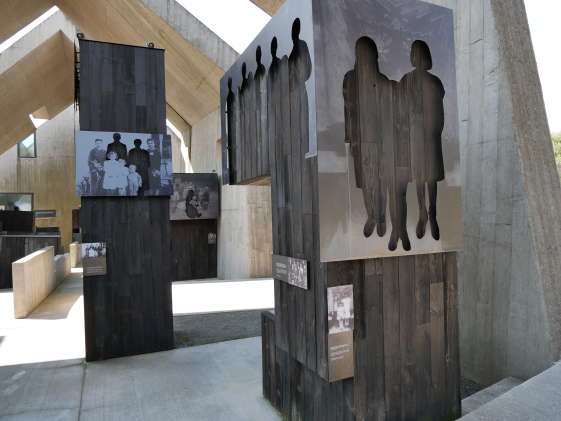May 2022 – October 2026 / online
Series „Postcolonial perspectives – postdependance entanglements” is organized in frames of two research projects sponsored by the National Science Centre, Poland “Remembering Soviet repressions in the post-multiple colonial Russian Far East”, no. 2020/39/B/HS6/02809 and Social Memory and the Post-Imperial Russian Heritage in Poland no. 2021/41/B/HS3/00852. These seminars are organized jointly with the Centre for Research on Social Memory. The seminars are held in Polish and/or English.
 Seminar with Oleg Reut (Philipp Schwartz Fellow at Johannes Gutenberg University Mainz): “‘Even a Cemetery Is Affected by the War’”
Seminar with Oleg Reut (Philipp Schwartz Fellow at Johannes Gutenberg University Mainz): “‘Even a Cemetery Is Affected by the War’”
 18 November 2025
18 November 2025
 English
English
This paper examines the transformation of cemeteries in Russia in the context of the ongoing war, authoritarian politics, and the digital age. Traditionally, burial spaces functioned as sites of social cohesion, where the dead remained integrated into the community of the living. Yet armed conflict and its mass casualties have profoundly unsettled these patterns, pushing death into the public sphere and reshaping both the material and symbolic dimensions of commemoration.
Military funerals no longer represent private or modest events but have become highly mediated performances, intertwined with official narratives and subject to censorship and informational warfare. At the same time, cemeteries emerge as arenas of contestation, where questions of social inequality, hierarchy, and legitimacy are negotiated through burial practices and disputes over prestigious plots. The paper explores these developments within broader debates on death tourism and digital remembrance. Cemeteries in Russia are revealed not only as dark heritage but also as complex public arenas where civic identity, belonging, and protest are articulated.
 Seminar with Alena Pfoser (Loughborough University, UK): “Tourism as memory-making: Russian tourism in the shadow of empire”
Seminar with Alena Pfoser (Loughborough University, UK): “Tourism as memory-making: Russian tourism in the shadow of empire”
 3 June 2025
3 June 2025
 English
English
Until recently the Russian Federation used to be one of the largest markets for outbound travel. Among Russians’ favourite destinations were cities that used to be part of the Russian Empire and the Soviet Union, and are now located in the independent nation-states bordering Russia. Based on extensive ethnographic research with tourists and tour guides in the cities of Tallinn, Kyiv, and Almaty before Russia’s full-scale war on Ukraine, the presentation provides an empirically rich and conceptually sophisticated account of the mnemonic interactions between Russians and their neighbours in the shadow of empire and geopolitical confrontations. It analyses the practices through which cultural memories are performed in tourism encounters, as well as the forms they take, discussing imperial nostalgia, the production and consumption of national pasts, and memory diplomacy as key modes of remembering in Russian tourism. Overall, the presentation reflects on the legacies of imperial patterns of thought in Russian tourism while also pointing to the limitations of focusing solely on imperial nostalgia when analysing Russians’ mnemonic relations to the territories of the former Soviet states.
The book on which the presentation is based is available in open access and can be downloaded here: Tourism as Memory-Making: Russian Tourism in the Shadow of Empire | SpringerLink
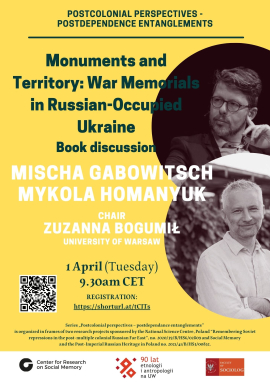 Book disussion with Mischa Gabowitsch and Mykola Homanyuk: “Monuments and Territory: War Memorials in Russian-Occupied Ukraine”
Book disussion with Mischa Gabowitsch and Mykola Homanyuk: “Monuments and Territory: War Memorials in Russian-Occupied Ukraine”
 1 Apr 2025
1 Apr 2025
 English
English
From the very first days of their large-scale attack on Ukraine in February 2022, the Russian invaders have made exceptional efforts to interact with the war memorial landscape of the newly occupied territories. They have destroyed some of these memorials, renovated others, and built new monuments amid continued fighting. They also used war memorials in countless propaganda photos and videos aimed for a domestic audience and largely escaping Western attention. Mykola Homanyuk spent several months in occupied Kherson conducting wartime on-site ethnography and collected sources on the change of the monumentscape. The book shows how Russian invaders believed their own propaganda about Soviet war memorials being mistreated in Ukraine, and what they did when they discovered well-maintained monuments on the ground. More broadly, it explores the connection between monuments and territorial claims by irredentist empires, as well as the enduring role of monuments in sustaining imperial conquest or, in other cases, colonization.
We recommend you to read the introduction and first chapter of the book beforehand (pp.1-38): https://ceupress.com/book/monuments-and-territory
 Seminar with Andriy Fert (Kyiv School of EconomicsKyiv School of Economics) on the topic: “Churches and the War-Time “Spiritual Decolonization" in Ukraine”
Seminar with Andriy Fert (Kyiv School of EconomicsKyiv School of Economics) on the topic: “Churches and the War-Time “Spiritual Decolonization" in Ukraine”
 21 Jan 2025
21 Jan 2025
 English
English
The colonial nature of the subordination of the Ukrainian Orthodox Church to the Patriarch of Moscow came to the fore in the late 2010s, prompted by the state campaign to gain official recognition of ecclesiastical independence from the Russian church administration. Unsurprisingly, with the Russian full-fledged invasion of Ukraine in 2022, the issue of coping with the legacy of Russian colonialism in church matters gained significant relevance for Ukrainian lawmakers and civil society activists. The Ukrainian Orthodox Church (UOC) faced increasing critique for spreading Russian propaganda in the form of religious practices, particularly venerating saints such as Russian emperor Nicolas II and medieval prince Alexander Nevsky or refusing to hold communal prayers in Ukrainian language in lieu of Old Slavonic. This presentation explores rank-and-file church members' responses to decolonization discourse by focusing on (un)changing saints' veneration practices and language issues at the grassroots level.
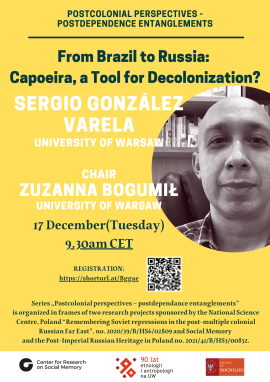 Seminar with Sergio González Varela (University of Warsaw) on the topic: “From Brazil to Russia: Capoeira, a Tool for Decolonization?”
Seminar with Sergio González Varela (University of Warsaw) on the topic: “From Brazil to Russia: Capoeira, a Tool for Decolonization?”
 17 Dec 2024
17 Dec 2024
 English
English
Capoeira is an Afro-Brazilian art form that combines ritual, play, music, and fighting elements. Created by slaves in the Northeast of Brazil, arguably in the seventeenth century, capoeira has been historically associated with the power of the weak. It has been used as a martial art to fight colonial oppression. During the twentieth century, it became a codified ritual that politically worked closely with the Black Marxist movement in Salvador, fighting for the recognition of the African heritage in Brazil. During the first two decades of the twenty-first century, capoeira has expanded globally. However, its spirit for liberation from dominant ideologies continues to captivate practitioners in Brazil and abroad. In this presentation, I describe how practitioners have used capoeira in Russia and how this country's practitioners have interpreted this art's rebellious spirit in a post-Soviet context. Finally, I contrast the subversive configuration of capoeira with the efforts made by dominant state powers to use martial arts in general as a political tool to show strength, authority, and subjugation of others.
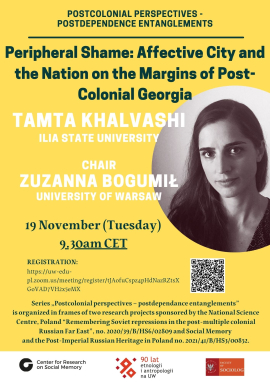 Seminar with Tamta Khalvashi (professor of Anthropology at Ilia State University in Georgia) on the topic: “Peripheral Shame: Affective City and the Nation on the Margins of Post-Colonial Georgia”
Seminar with Tamta Khalvashi (professor of Anthropology at Ilia State University in Georgia) on the topic: “Peripheral Shame: Affective City and the Nation on the Margins of Post-Colonial Georgia”
 19 Nov 2024
19 Nov 2024
 English
English
Based on the forthcoming book Peripheral Shame: Affective City and the Nation on the Margins of Post-Colonial Georgia, Tamta Khalvashi explores post-Soviet Georgia as a unique postcolonial space that gives rise to an affective condition of peripheral shame. By mixing family archives and autoethnographic reflections with traditional fieldwork material, she follows glimpses of this shame in various urban settings, from the monuments on the move to indebted houses or from unburied bodies of Soviet mass killings to awkward coexistence of different religious and ethnic groups in urban courtyards of Batumi on the western edge of Georgia. Khalvashi offers a new way of conceiving shame, not just as a feeling of stratified geopolitical, social, or personal relations but as an impulse to straddle with or repair ongoing peripheral frictions. She thus approaches shame as a productive feeling that gives rise to inconvenient coexistence, which is the only way to live and survive on the margins of the postcolonial world.
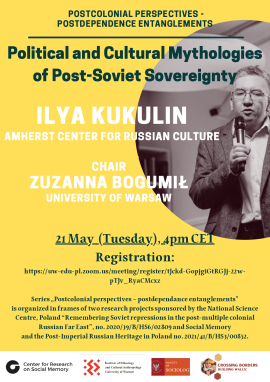
Seminar with Ilya Kukulin (a research fellow at the Amherst Center for Russian Culture) on the topic: “Political and Cultural Mythologies of Post-Soviet Sovereignty”
 21 May 2024
21 May 2024
 English
English
The new states on the ruins of the USSR emerged not as a result of the struggle of enslaved peoples, but as a result of the crisis of central power. We could now discuss in what ways the new political elites of the former “union republics” -- and especially Russia -- reproduced the Soviet notion of sovereignty, and what new elements were included in this notion. In my paper, I hope to discuss the cultural and political mythologies of sovereignty that have proliferated in the public rhetoric and Russian language literature of the “perestroika” period and in Russia in the 1990s.
 Book discussion with the editor Alima Bissenova (Nazarbayev University) on a book “Labyrinth of Postcoloniality” (2023). Moderator: Zuzanna Bogumił
Book discussion with the editor Alima Bissenova (Nazarbayev University) on a book “Labyrinth of Postcoloniality” (2023). Moderator: Zuzanna Bogumił
 21 April 2024
21 April 2024
 English
English
This collection is an attempt to form a new post-colonial agenda, in which we, seven Kazakhstani authors, are trying to rethink and theorize our current state from the position of our own locality and develop a “local” point of view on the most pressing issues of “our post-coloniality” - a point of view that would be pronouncedly local but, at the same time, global – connected with the universal post-colonial experience.
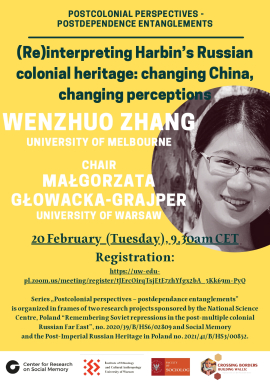 Seminar with Wenzhuo Zhang (University of Melbourne ) on the topic: “(Re)interpreting Harbin’s Russian colonial heritage: changing China, changing perceptions.” Moderator: Małgorzata Głowacka-Grajper.
Seminar with Wenzhuo Zhang (University of Melbourne ) on the topic: “(Re)interpreting Harbin’s Russian colonial heritage: changing China, changing perceptions.” Moderator: Małgorzata Głowacka-Grajper.
 21 February 2024
21 February 2024
 English
English
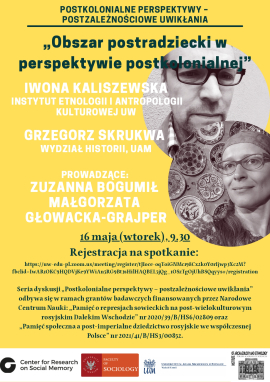 Rozmowa z Iwoną Kaliszewską, (Instytut Etnologii i Antropologii Kulturowej UW) i Grzegorzem Skrukwą (Wydział Historii, UAM) na temat „Obszar postradziecki w perspektywie postkolonialnej”. Moderator: Zuzanna Bogumił
Rozmowa z Iwoną Kaliszewską, (Instytut Etnologii i Antropologii Kulturowej UW) i Grzegorzem Skrukwą (Wydział Historii, UAM) na temat „Obszar postradziecki w perspektywie postkolonialnej”. Moderator: Zuzanna Bogumił
 16 maja 2023
16 maja 2023
 Polski
Polski
Rok temu w maju zainicjowałyśmy spotkania z serii „Postkolonialne perspektywy – postzależnościowe uwikłania”. Rok od tego spotkania i ponad rok od pełnoskalowej militarnej agresji Rosji na Ukrainę perpektywa post-kolonialna i post-imperialna stała się niemalże normą w mówieniu o wojnie w Ukrainie i analizowaniu przemian społecznych i kulturowych zachodzących w wielu państwach postradzieckich.
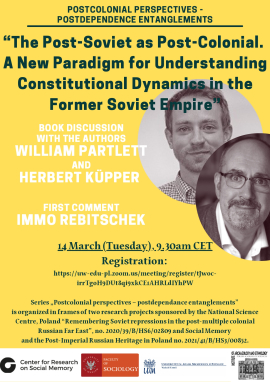
Book discussion with the authors William Partlett (University of Melbourne,) and Herbert Küpper (Research Centre for Eastern and South Eastern Europe, Regensburg) on the book “The Post-Soviet as Post-Colonial. A New Paradigm for Understanding Constitutional Dynamics in the Former Soviet Empire” (Edward Elgar 2022)
 14 March 2023
14 March 2023
 English
English
First comment: Immo Rebitschek (Friedrich Schiller University Jena)
Chair: Małgorzata Głowacka-Grajper (Faculty of Sociology UW)
The Post-Soviet as Post-Colonial. A New Paradigm for Understanding Constitutional Dynamics in the Former Soviet Empire describes the collapse of the Soviet Union as a moment of decolonization and the post-1991 constitution-building experience as a postcolonial one. Partlett and Küpper’s application of the post-colonial paradigm to the former Soviet world adds new facets to post-colonial constitutional theory by presenting a third type of (ideology-based) colonialism and a third type of decolonization.
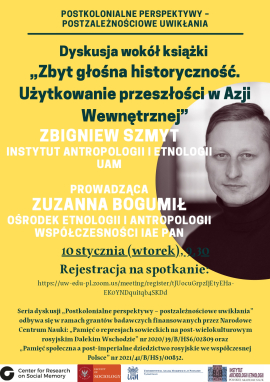
Dyskusja wokół książki Zbigniewa Szmyta (Uniwersytet Adama Mickiewicza) zatytułowanej, “Zbyt głośna historyczność Użytkowanie przeszłości w Azji Wewnętrznej” (Wydawnictwo Naukowe UAM, 2020). Spotkanie prowadzi Zuzanna Bogumił
 10 Stycznia 2023
10 Stycznia 2023
 English
English
Zbyt głośna historyczność opisuje poszukiwania użytecznej przeszłości prowadzone przez mieszkańców postsocjalistycznej Azji Wewnętrznej. Autor, traktując historię jako politykę skierowaną ku przeszłości, analizuje jej użycia na poziomie państwa, społeczności lokalnej i na poziomie rodzinnym. Wiele uwagi zostało poświęcone praktycznym formom funkcjonowania przeszłości wykraczającym poza tradycyjną historiografię i politykę historyczną, a także poza instytucje ją reprodukujące: szkoły, muzea, uniwersytety.
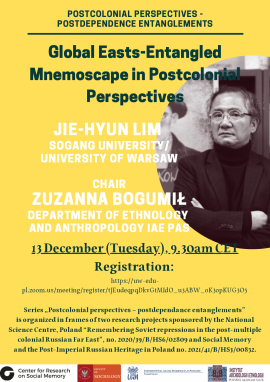 Seminar with Jie-Hyun Lim (Sogang University/ University of Warsaw), on the subject of "Global Easts-Entangled Mnemoscape in Postcolonial Perspectives". Moderator: Zuzanna Bogumił (Institute of Archaeology and Ethnology PAS)
Seminar with Jie-Hyun Lim (Sogang University/ University of Warsaw), on the subject of "Global Easts-Entangled Mnemoscape in Postcolonial Perspectives". Moderator: Zuzanna Bogumił (Institute of Archaeology and Ethnology PAS)
 13 December 2022
13 December 2022
 English
English
The end of the global Cold War has dramatically reconfigured the mnemoscape in the third millennium. In Eastern Europe, released memories of Stalinist terror and Holocaust collaboration unboxed the pandora box of conflictual memories. In East Asia and the other peripheral region, the West could no longer marginalize the memories of colonial genocide and atrocities because the imperative to defend Western civilization against Soviet communism had lost its historical force. With a focus on global Easts-Eastern Europe and East Asia, I will probe for the non-hierarchal comparability and multidirectional interactions among the memories of the Holocaust, colonialist crimes, and the Stalinist terror. Dislocating this triple victimhood from the memorial provincialism and relocating it in the postcolonial perspectives would be the first step towards mnemonic solidarity. Suggesting “critical relativization” and “radical juxtaposition” as conceptual tools, I will try to rescue global memories from remembering provincialism.
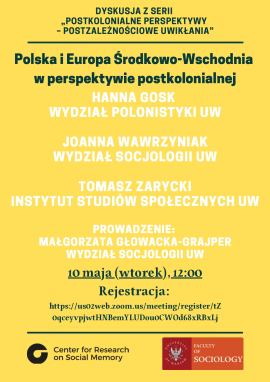
Dyskusja z Hanną Gosk (Wydział Polonistyki UW), Joanną Wawrzyniak, (Wydział Socjologii UW) i Tomaszem Zaryckim (Instytut Studiów Społecznych UW) na temat „Polska i Europa Środkowo-Wschodnia w perspektywie postkolonialnej”. Prowadzenie: Małgorzata Głowacka-Grajper (Wydział Socjologii UW)
 10 Maja 2022
10 Maja 2022
A|Z English
Militarna napaść Federacji Rosyjskiej na Ukrainę 24 lutego 2022, poprzedzona rewizjonistycznym wykładem historycznym Władimira Putina na temat historii Ukrainy oraz przedstawieniem pożądanego przez Rosję porządku geopolitycznego w Europie Środkowo-Wschodniej, a następnie reakcje UE i NATO na wywołaną przez Rosję wojnę, w sposób wyrazisty pokazały trwałość zależnościowej sytuacji mieszkańców regionu Europy Środkowo-Wschodniej. Włączanie interpretacji historii Polski i całego regionu w nurt studiów postkolonialnych ma już swoją długoletnią tradycję, lecz ciągle aktualne pozostaje pytanie o to, co badania nad kolonializmem i perspektywa post-kolonialna (de-kolonialna) mogą wnieść do rozumienia przeszłości i aktualnej sytuacji państw i społeczeństw regionu (w różnych wymiarach – od ekonomicznego, przez polityczny, po kulturowy).
